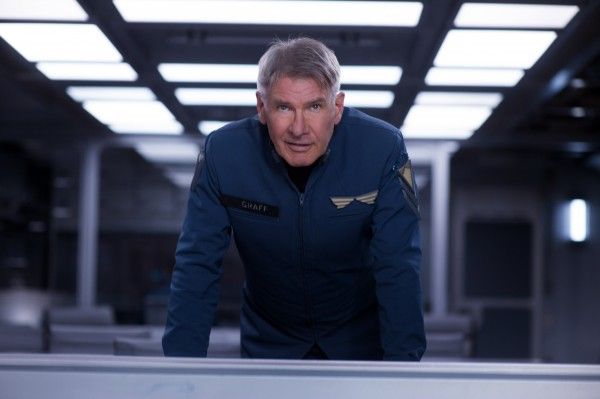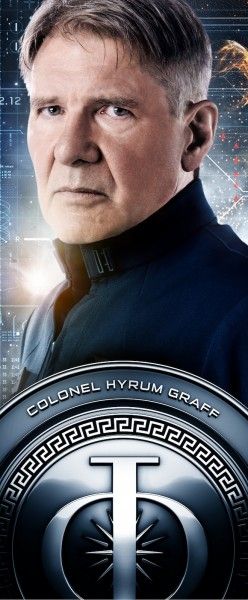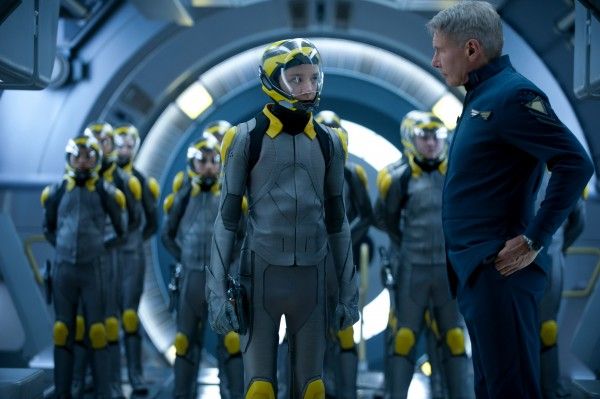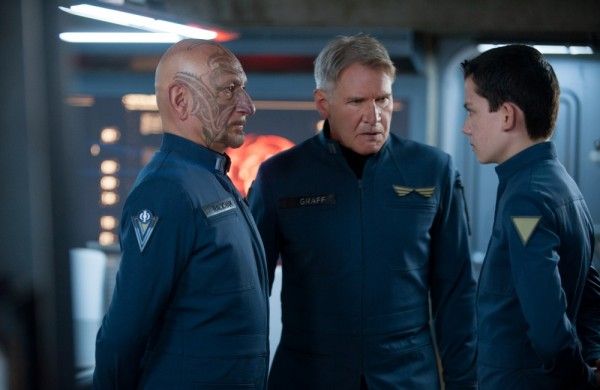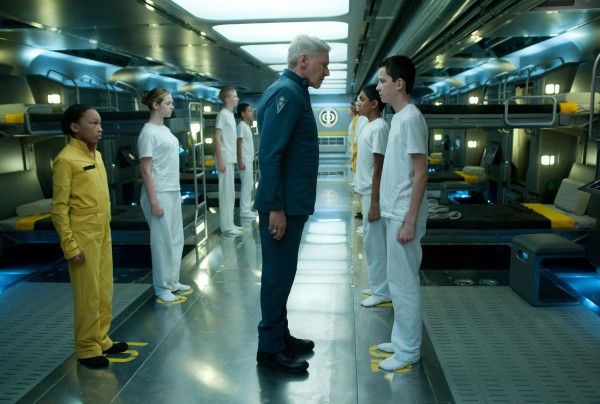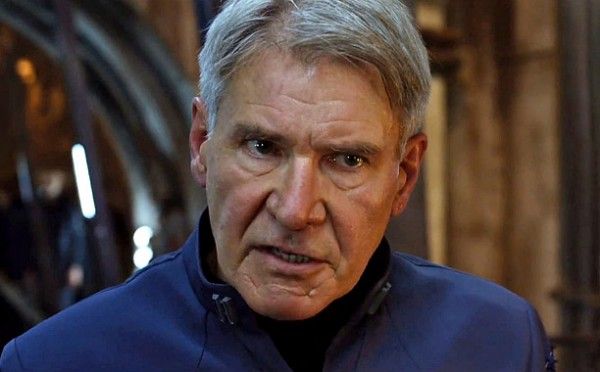Academy Award nominee Harrison Ford embarks on an exciting new adventure in space bringing credibility and charm to a complicated role in the sci-fi action thriller Ender’s Game opening November 1st. After the people of Earth survive a devastating alien attack, Battle School commander Hyrum Graff (Ford) trains a new generation of child geniuses to be warriors to meet the threat of another imminent invasion. Among them is a brilliant and remarkably gifted 12-year-old, Ender Wiggins (Asa Butterfield), who shows great promise to become Earth’s next ultimate military leader. Written for the screen and directed by Gavin Hood based on the Hugo and Nebula Award-winning novel by Orson Scott Card, the film also stars Hailee Steinfeld, Viola Davis, Abigail Breslin and Sir Ben Kingsley.
In an engaging interview at the film’s recent press day, Ford talked about what intrigued him when he first read the script, why he feels the questions it raises make it a good family movie, what it was like sharing the screen with young star Butterfield and veteran actors Davis and Kingsley, how the visual effects technology used to shoot space sequences has evolved since Star Wars, why he enjoys the collaborative process of filmmaking and wants to continue to perfect his talents, what he learned as a young actor working on American Graffiti, why he doesn’t consider himself an icon, his thoughts on the Oscar campaign for 42, and his advice for someone just starting out on the journey of being an actor. Hit the jump to read the interview:
QUESTION: Mr. Ford, congratulations on a great job in this film. Can you talk a little bit about how it appealed to you and had you read the book in the past?
HARRISON FORD: I actually read the script before I read the book. I thought it was an interesting subject that I hadn’t seen in film. I saw an interesting character that was responsible for supporting some questions about responsibility, the military, the relationships between young people and old people, and a lot of things that intrigued me. When I met with the filmmakers, I had a sense that they were very ambitious and focused on making a film that I thought would be useful to a young audience. So, it was altogether attractive to me.
The movie is very intellectual. Are there any themes or questions specifically for young boys or girls that watch this that you feel might come up or should be discussed?
FORD: Well, I think a lot of questions will be raised, and that’s why I think it’s a really good family movie. I think young people are likely to drag their parents to this movie and require answers from them about what’s going on here. And the other way around, I think parents may wish to bring their young people to this movie as well. The themes are individual responsibilities, the leadership capacities, and what the military does to create leadership capacity. But this is a strange situation here. We’re talking about a world government meeting the threat of an alien invasion. So there are not the usual issues of militarism and military adventure. This is not one country with a national interest trying to control another country. This is not a kind of national patriotism. This military is in aid of protecting life on Earth. So, while these themes seem familiar, they’re a little bit differentiated by the world and the context that they come up in.
Did you ever think you’d go back into outer space?
FORD: It doesn’t matter to me whether I go back into outer space or not. The job is the same and I don’t have any sort of genre preferences. I’m just looking for a good story, a good character, whether Earth-bound or not.
Gavin Hood said Asa was the only actor who could really work well opposite you as far as the chemistry dynamic. What are your thoughts on that?
FORD: Oh, I’ve heard him say that. I think what he’s saying is that Asa has a kind of strength and capacity and that he was concerned about having a…. Well, let’s face it, Asa was cast before I was, and Gavin was glad that he felt that Asa had the strength to stand up against blah, blah, blah. (Laughter) But I think that’s Gavin’s attempt to be flattering to me more than anything else. Asa is an amazing young person. He’s a very accomplished actor. He’s got a wonderful capacity to focus and concentrate. And, he has a wonderful work ethic. And that, combined with talent, I think bodes well for his future.
Harrison, since last shooting space sequences in Star Wars and now with the technology that Gavin’s using to shoot Ender’s Game, are there any significant changes that have impacted you as a performer?
FORD: Well, obviously the techniques to create the visual elements have changed enormously. When we were making Star Wars, they were putting together space ships out of plastic model kits of cars and boats and trains and gluing them all together, and then putting them on a stick and flying them past the camera. (Laughter) And it worked. It was fine. Add a little music and you believed that big spaceship coming over your head. The capacity to create effects in the computer has made the job easier, but it has also introduced the complexity that you can with a few more keystrokes generate such a busy canvas that the eye doesn’t know where to go. You lose human scale on an event and you’re just wowed by the kinetics and the visualization. But, often in those cases I feel you lose touch with the human characters and what it is that they would feel and how they might feel, and that’s still the most important part. So I think you have to be very careful with effects that they don’t overpower the story with the visual element.
What was more fun for you – playing Hans Solo flying around the universe in the Millennium Falcon or Colonel Hyrum Graff commanding a Battle Ship Cruiser?
FORD: Well, I wasn’t in command of anything in there. In Ender’s Game, I don’t command anything. I’m a trainer and responsible for the school. And the young character, Ender, is orchestrating a battle that’s being fought remotely. For me, the fun of movies is always the collaboration, the work itself on the set.
I understand you did some wirework for the zero gravity scenes. What was that experience like?
FORD: It was another day at the office. (Laughter) It’s basically nothing too spectacular. You put on a harness and they cut a couple holes in your costume and hang you from wires.
I’ve heard it’s uncomfortable.
FORD: Yeah, but it’s better than a real job. (Laughter) You do that for a couple of hours and it’s no big deal. For the kids, it was quite a rigorous training because they had so much of it to do. I did it in an environment where there were hand holds, so I could balance for a brief period of time on the wires and then propel myself, or appear to propel myself, when in fact somebody was sliding a trolley overhead that I was hanging from. But the kids really had to maintain that balance without any hand holds. They worked really hard and I didn’t have much to do.
Was there any muscle pain after that?
FORD: (Laughs) Nah.
Can you talk about your experience working with actors Sir Ben Kingsley and Viola Davis?
FORD: Yes, with great pleasure. I have the utmost respect for Sir Ben Kingsley and Lady Davis. (Laughter) They’re both tremendous actors and I was delighted to have the opportunity to work with them. Sir Ben is hugely imaginative in the creation of his characters. I had no idea what to expect from his version of Mazer Rackham. I thought it was really intriguing and useful in the telling of the story. And Viola is just a wonderful, visceral actor to work with, and I enjoyed working with her also, enormously. I was very pleased to be able to work with both of them.
You have built a career out of roles that have been intriguing and engaging. Is it still easy to find those roles or are they a little harder to look for, and can you find something intriguing and engaging about the fifth part in the series of films?
FORD: What I look for is identifying what the utility of a character is to the telling of the story overall. If I can identify that from reading the script, then I’ve got a clear idea of whether or not I think the character is worth playing, and then, the creation of that character. Is it fully realized? Is there more work to be done? Can I think of an idea that might make it better? I just like the process of taking something written on a sheet of paper and giving it life and shape. I like the collaborative process of filmmaking, which is all simply to say that I love my work and I would continue to look for things that have the potential to be engaging and successful, whether it’s the first time it’s been done or the fifth time it’s been done. What I always looked for in the Indiana Jones films was that we advanced the notion of the character and the audience’s understanding of the character from each film to the next in an ambitious way. So Indiana Jones’ father would appear. Indiana Jones’ long lost love and the son he never knew would appear. All of that made it very much more interesting to me. The potential to build on the audience’s knowledge of a character, you can take advantage of that, I think, if you’re ambitious.
In this film, which takes place in the 21st century, the kids play games but they don’t play outside anymore and they still have bullies at school. When you were 12 years old, what kind of kid were you?
FORD: I grew up in a city, and instead of playing games in space, we played Cowboys and Indians. We played games that were built on imagination. We used to play Superman or crazy stuff based on the characters that we knew from comic books and stories. I think kids will always have an imagination. Right now their imagination is stimulated by electronic games often. I have a 12-year-old and I see all of his friends. They play outside a lot. Their parents limit the amount of time that they can spend playing with a video game or they’re on their little iPhones and things. I think parenting is a huge responsibility. It was in my time when I was growing up and there still continues to be that responsibility. This film is one of those opportunities to do some parenting and engage your kids with some of the issues that this film speaks to.
Throughout your career and with the roles you’ve played, you’ve earned the adjective “icon.” Was this a role that you were able to perhaps put that iconic reputation to work for you and are there other roles where you have to figure out ways to work around that?
FORD: An icon means nothing to me. I don’t understand what it means to anybody actually. It seems like a word of convenience. It seems to attend to the huge success of certain kinds of movies that I did, but there’s no personal utility in being an icon. I don’t know what an icon does, except stand in a corner quietly accepting everyone’s attention. I like to work, so there’s no utility in being an icon. I don’t even think about it so I don’t really know how to answer your question.
American Graffiti was 40 years ago. Was there something that you learned from that film that you can apply to the work you’re still doing today?
FORD: Well I think I was at a fairly early stage in my career and I was learning everything. I was learning how to deal with the cameras. I was learning how to deal with a director. I was learning how to think about story. And all of those things are considerations still. And I think I’m still learning. I’m still interested in perfecting whatever talents I have and continuing to grow as an actor and continuing to be useful to the telling of the story.
You’ve had a great year with playing Branch Rickey in 42 and now your role in this movie. I understand Warner Bros. is screening 42 for Oscar consideration. How important would that be for you?
FORD: (laughs) I think the campaign is largely in aid of drawing a greater audience to the film. I think that would be a good thing. 42 is a wonderful movie and I’m very proud of the movie. What can I say?
What advice can you give to somebody young that’s just starting the journey of being an actor?
FORD: I’m not prone to giving advice. What I think is important for a young person is to figure out how to be useful and not be so concentrated on themselves, but to see what they can do to make the overall collaboration with all the other people involved in a movie work better. But I also think it’s important not to base your ambition on anybody else’s history, but to figure out how best to use your own particular personality and understanding of yourself to help tell other people’s stories. So, I guess there are two things there: work hard and figure out how to be useful and don’t try to imitate anybody else’s success. Figure out how to do it for yourself with yourself.
Ender's Game opens this weekend.

